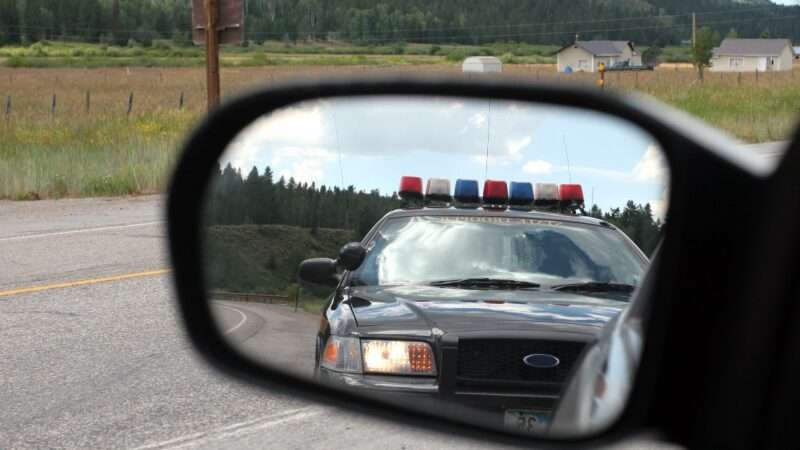
Law enforcement in Kansas raked in $21 million through civil asset forfeiture over the past two years, according to a report released this week by the Americans for Prosperity Foundation (AFPF).
The report, drawing on a new state database, found that Kansas police seized $21.3 million from people in the state between July 2019 and the end of 2021. Of those cases, less than one-quarter of the owners have been convicted of a crime.
Under civil asset forfeiture laws, police can seize property suspected of being connected to criminal activity without charging the owner with a crime. Law enforcement groups say it's a vital tool to disrupt drug trafficking and criminal networks by targeting their illicit revenues. However, civil liberties groups, news outlets, and a broad spectrum of advocacy groups have published numerous reports over the years arguing that asset forfeiture lacks due process protections and often targets everyday people, rather than cartel lords.
The AFPF report found that half of all reported seizures in Kansas had a value of $3,100 or less, meaning it would be impractical in those cases, if not a net loss, to hire an attorney to try and recover one's property.
"Civil asset forfeiture laws imperil people's rights to property and due process. This is especially true in states such as Kansas, where law enforcement receives all the proceeds from forfeited property," AFPF-Kansas State Director Elizabeth Patton said in a press release. "The arrangement creates a compelling profit motive for law enforcement to seize people's assets. Our analysis of the KBI data calls into question the motivation for most forfeiture activities in Kansas: to protect public safety or generate revenue?"
Take the 2017 case of Salvador Franco, a Las Vegas resident. After a drug dog alerted on Franco's car, the Kansas Highway Patrol searched it. They didn't find any drugs, but they did find $32,000 in cash under his seat. Franco said he was driving to St. Louis to buy a truck he'd been saving up for. The officers seized Franco's cash, even though they never charged him with a crime.
More recently, sheriff's deputies in Kansas and California colluded with the Drug Enforcement Administration to seize cash from armored cars operated by Empyreal Logistics, a company that serves state-licensed marijuana businesses. Reason's Jacob Sullum reported:
On May 17, Dickinson County Sheriff's Deputy Kalen Robinson pulled over one of Empyreal's vans on Interstate 70 in Kansas, ostensibly because the Colorado tag number was partially obstructed by the license plate frame. Robinson grilled the driver, who explained that she planned to pick up cash from licensed medical marijuana dispensaries in Kansas City, Missouri, the next day, then take it to a credit union in Colorado, which would entail traveling through Kansas again on the same highway. Robinson let the driver proceed on her way without issuing a citation, but the federal Drug Enforcement Administration (DEA) kept an eye on the van the following morning as it visited the Missouri dispensaries.
Later that day, Robinson stopped the van again as it traveled west on Interstate 70, seizing more than $165,000 in cash from its vault. In September, the Justice Department filed a civil forfeiture complaint seeking to keep the money. If the government prevails, the Dickinson County Sheriff's Department will get up to 80 percent of the loot under the Justice Department's "equitable sharing" program.
After Empyreal sued, arguing that the marijuana dispensaries it served were all operating within state laws, the federal government agreed to return more than $1 million that police had seized. However, the settlement does not address the $165,000 seized by Kansas sheriff's deputies.
The AFPF report notes that the numbers reported by Kansas omit more than $5 million that state and local police transferred to the federal government.
Under the Justice Department's equitable sharing program, federal authorities may "adopt" state and local civil asset forfeiture cases and pursue them at the federal level. Local police departments who partner with the feds get to keep up to 80 percent of the forfeiture revenue, while the rest goes into the equitable sharing pool and is distributed among partner departments around the country. Critics of asset forfeiture say this essentially allows state and local police to bypass stricter state regulations.
Around 35 states have passed some form of civil asset forfeiture reform over the past decade, often by wide bipartisan margins, in response to outrageous stories of forfeiture abuse.
In 2018, Kansas enacted a law requiring police departments to report the date, location, and value of asset seizures, as well as whether or not criminal charges were filed in conjunction with the seizure. It also required police departments to start showing how they spend forfeiture revenues.
However, in April the Kansas Reflector reported that there were widespread errors in the required reports. "More than half of the law enforcement agencies have failed to report some of their seizures as required and have done so with the blessing of the Kansas Bureau of Investigation," the news outlet found.
The post Kansas Seized $21 Million From People Over the Past Two Years. Most Were Never Convicted of a Crime appeared first on Reason.com.







